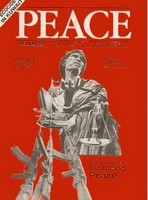
Peace Magazine Jul-Aug 1991, page 26. Some rights reserved.
Search for other articles by Leonard V Johnson here
By Robert W. Malcolmson. McGill-Queens University Press, 1990. Reviewed by Leonard V. Johnson
One sunny morning in June, 1989, during a visit to the Department of External Affairs, I was informed by Peggy Mason, now Ambassador for Disarmament, that it was futile to attempt to persuade the government to support a nuclear delivery systems flight test ban as long as it was committed to nuclear deterrence. That remarkable bit of candor focused my mind wonderfully, and I thank her for it. As long as governments believe that nuclear weapons have kept the peace since 1945 and are indispensable to national security, then it is rational-even mandatory-for Canadian governments to do whatever the Americans say is necessary to develop, test, and deploy their nuclear weapons. That being the case, I no longer waste ink and breath lobbying our government on such issues as the comprehensive test ban, port visits by nuclear-capable warships, nuclear weapons-free zones, cruise missile testing, and so on. This is not to discourage anyone else from doing so, but I choose not to spend my time that way when the major premises of nuclear deterrence are so vulnerable to critical reason. My late father, a moose hunter of renown, did not waste his ammunition on the hooves and horns when he could get a clear shot at the heart of the animal.
Bob Malcolmson, professor of history at Queen's University and author of Nuclear Fallacies : How We Have Been Misguided since Hiroshima, has returned to his theme in this brief, readable, and timely book. Other authors have attacked the logic of deterrence on philosophical grounds, but politicians and their advisors do not read philosophical works, much less be guided by them, for they are always concerned with matters of the moment disconnected from their past. Neither do their critics, who are usually more concerned with technological developments and their assumed strategic implications than with the long-term historical trends of the phenomena they are judging.
Malcolmson traces the history of nuclear thought from its beginnings. He shows how the American illusion that possession of overwhelming explosive power could be translated into political power ended the invulnerability that both the U.S. and Canada had enjoyed before the 1950s, leading to absolute insecurity. This insecurity was foreseen, even before the Soviets exploded their first atomic bomb in 1949, but those who voiced the warnings were scorned or pilloried as communist sympathizers. One is led to the conclusion that the proponents of nuclear deterrence were-and are-either not bright enough for their jobs or that they are disloyal to the people they are to serve. What they did accomplish was the military and political domination of the so-called "free" world, and maybe that was their aim from the beginning. The consequences of this hegemony are now writ large in the Gulf crisis, where self-interest in the uniform of world policeman is leading toward catastrophe.
Beyond Nuclear Thinking is essential reading for people concerned with peace and security in the 1990s. It is the right book at the right time.
Leonard V. Johnson is the Chair-person, Project Ploughshares and, Canadian Pugwash Group.

Peace Magazine Jul-Aug 1991, page 26. Some rights reserved.
Search for other articles by Leonard V Johnson here